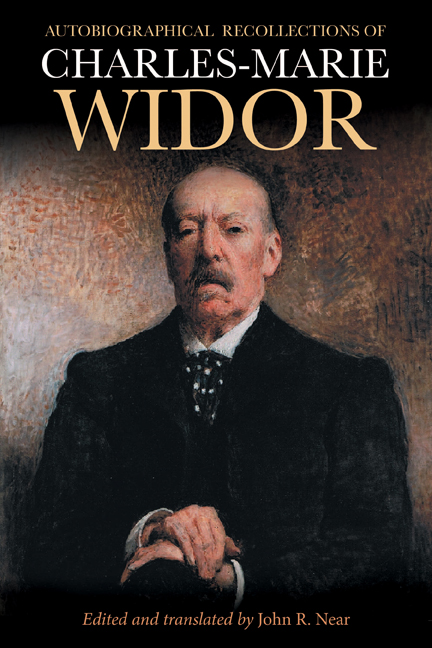Book contents
- Frontmatter
- Contents
- List of Illustrations
- Foreword
- Preface
- Acknowledgments
- Introduction: Tribute to Charles-Marie Widor
- Part One Studies, Early Performances, and Aristide Cavaillé-Coll (1844–69)
- Part Two La Belle Époque: The Franco-Prussian War to The Great War (1870–1914)
- Part Three The Great War and Important Initiatives (1914–37)
- Appendix 1 Birth record of Charles-Marie Widor, 1844
- Appendix 2 Widor’s Diplôme de Bachelier ès Lettres, 1863
- Appendix 3 Widor’s letter of appreciation to Jacques Lemmens, 1863
- Appendix 4 Brussels Ducal Palace organ specification, 1861
- Appendix 5 Widor’s certificate for Chevalier de l’Ordre du Christ, 1866
- Appendix 6 “To Budapest,” 1893
- Appendix 7 Widor’s travels to Russia and his 1903 passport
- Appendix 8 Widor’s list of his works in 1894
- Appendix 9 The Paris Conservatory organs, 1872
- Appendix 10 Chronique [Widor’s appeal for an organ hall at the Paris Conservatory, 1895]
- Appendix 11 Widor’s certificate for the Académie Royale, Brussels, 1908
- Appendix 12 “Debussy & Rodin,” 1927
- Appendix 13 The American Conservatory organ, Fontainebleau, 1925
- Appendix 14 Letters concerning the Trocadéro organ restoration, 1926
- Notes
- Bibliography
- Index
- Eastman Studies in Music
5 - Concerts at Cavaillé-Coll’s demonstration hall
Published online by Cambridge University Press: 09 May 2024
- Frontmatter
- Contents
- List of Illustrations
- Foreword
- Preface
- Acknowledgments
- Introduction: Tribute to Charles-Marie Widor
- Part One Studies, Early Performances, and Aristide Cavaillé-Coll (1844–69)
- Part Two La Belle Époque: The Franco-Prussian War to The Great War (1870–1914)
- Part Three The Great War and Important Initiatives (1914–37)
- Appendix 1 Birth record of Charles-Marie Widor, 1844
- Appendix 2 Widor’s Diplôme de Bachelier ès Lettres, 1863
- Appendix 3 Widor’s letter of appreciation to Jacques Lemmens, 1863
- Appendix 4 Brussels Ducal Palace organ specification, 1861
- Appendix 5 Widor’s certificate for Chevalier de l’Ordre du Christ, 1866
- Appendix 6 “To Budapest,” 1893
- Appendix 7 Widor’s travels to Russia and his 1903 passport
- Appendix 8 Widor’s list of his works in 1894
- Appendix 9 The Paris Conservatory organs, 1872
- Appendix 10 Chronique [Widor’s appeal for an organ hall at the Paris Conservatory, 1895]
- Appendix 11 Widor’s certificate for the Académie Royale, Brussels, 1908
- Appendix 12 “Debussy & Rodin,” 1927
- Appendix 13 The American Conservatory organ, Fontainebleau, 1925
- Appendix 14 Letters concerning the Trocadéro organ restoration, 1926
- Notes
- Bibliography
- Index
- Eastman Studies in Music
Summary
Père Cavaillé-Coll, of whom I was more and more the chosen one [la chose], although there was never any agreement between us, thought of me for each inauguration of his instruments, as he did of Guilmant—though the latter less and less due to his age. So, I inaugurated most of his organs. At that time, I inaugurated the organs of Calais, Trouville, and Bonsecours. In the meantime, to impose myself on the Parisian musical public, his organ showroom on the avenue du Maine became for me a concert hall almost every two weeks. All Parisian music lovers and intellectuals interested in the arts frequented there. However, not only the organ was played; Érard had sent one of his finest instruments there. At that time there was a remarkable violinist, José White, and a no less excellent cellist, Jules-Bernard Lasserre. It was there that I met most of the great Parisian artists: Élie Delaborde, who was head of the piano school at the Conservatory; Paul Taffanel, the eminent flutist who became conductor at the Opéra; and Ernesto Sivori, who was a pupil of Niccolò Paganini. Naturally, all the churchwardens of Saint-Sulpice and their families were invited.
At that time, I specially composed several small pieces with organ, some of which I kept, but carefully destroyed a few others. In short, I acquired a kind of reputation before the public that counted in Paris, thanks to these performances that took place in the evening.
Cavaillé himself had built this business at 15 avenue du Maine. Unfortunately, it has just been handed over to demolition workers. His house was next door, where he lived with his family, Mme Cavaillé and their children. Adjoining his house was a large hall, designed for good acoustics— that is to say, a rectangular hall of the right proportions. Cavaillé-Coll placed his instruments everywhere, and this allowed him to experience the best conditions for sound. He himself made experiments whose principle is as follows: “Sound must be produced in rectilinear surfaces, as curved surfaces generate echoes.” When I pointed out to him one day that it was simply the theory of the ancients that he was reviving, and that all ancient theaters had a rectangular stage, he replied with the charming naivety of the simple and good man that he was: “I didn't know that the ancients had so much experience!” The assertion was charming.
- Type
- Chapter
- Information
- Autobiographical Recollections of Charles-Marie Widor , pp. 13 - 14Publisher: Boydell & BrewerPrint publication year: 2024



